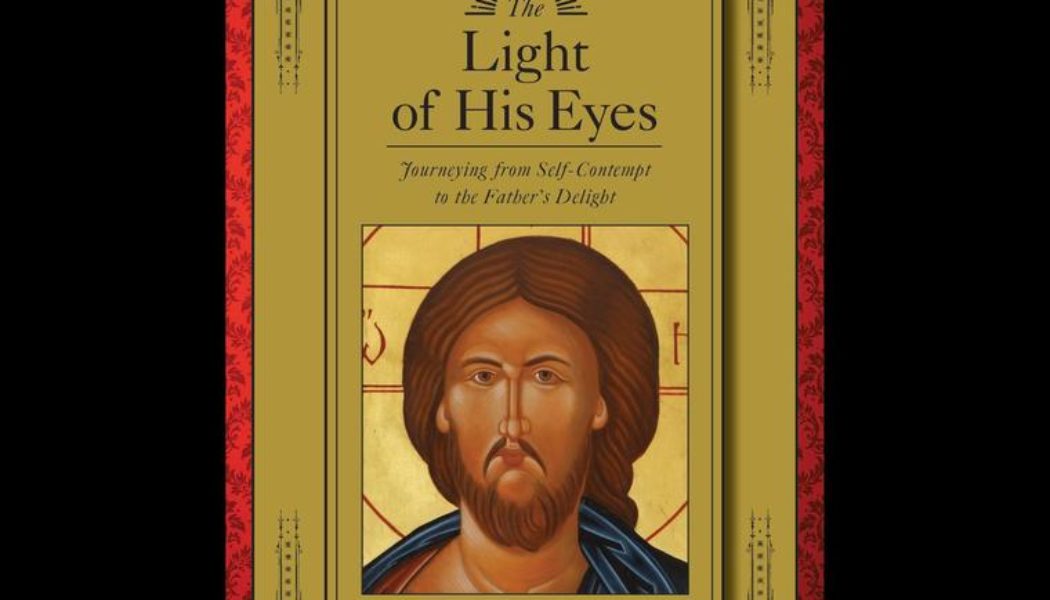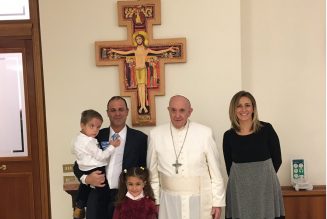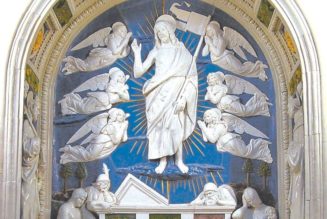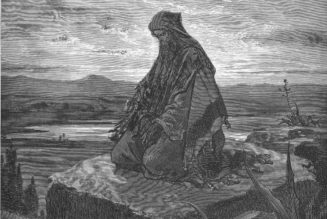
It’s rare to find new books written by female religious. It’s even more rare to find one written by an Eastern Catholic nun. That’s why I reached out to Mother Iliana, a nun at Christ the Bridegroom Monastery in Burton, Ohio, who has just written an excellent book on the interior life.
Published by Sophia Institute Press, The Light of His Eyes: Journeying from Self-Contempt to the Father’s Delight, is Mother Iliana’s personal reflection on the journey of the soul to the realization of the Father’s tremendous love for each of us. Having read Mother’s book, I can attest that her accessible style delivers a timeless Gospel message that will resonate no matter the stage of your spiritual journey.
I submitted a series of interview questions to Mother and her responses are presented below.
Tell us a bit about yourself and why you decided to write the book. What drew you to the theme of transformation from our own pitfalls to the freedom of the Father’s love?
I am a Byzantine Catholic nun of Christ the Bridegroom Monastery in the Eparchy of Parma, Ohio. I worked as a Neonatal Nurse Practitioner before entering the monastery. I am the great-granddaughter of a priest-martyr, the daughter of a priest, and the niece of a bishop, so it is safe to say that I grew up in the heart of the Ukrainian Greek Catholic Church.
As we know, the Church is not so much like a museum of saint statues but more like a field hospital for sick sinners, so in spite of growing up in the heart of the Church, I was not spared the consequences of sin. Although it is true that from my first moments, I was surrounded by the sacraments, Liturgy, icons, Scripture, stories of saints, and prayer, and although I had a real hunger and thirst to know God even as a child, I also carried within me the terrible pain of thinking that I was a perpetual disappointment to him.
I carried this pain for decades because I didn’t really know who I was. I didn’t know that the Father delighted in me, not because of what I did, but because of who I was. I had never planned on writing a book on any theme whatsoever, yet in the moment that the Father revealed to my heart that I was the light of his eyes, he also gave me the idea for this book. I would eventually realize that the struggle I had in receiving the Father’s love for me in my weakness was to a greater or lesser extent a universal struggle, and so I risked sharing the book with a publisher, thereby sharing it with all of you.
This book is dripping with Scripture. How did you come to understand the Father’s love for you through Scripture and what guidance can you give to our readers about getting started exploring the Bible as a pathway to the Father?
My initial encounter with the Father’s love for me specifically through Scripture was through hearing him speaking to my heart the words, “You are mine”, which I would later discover in the words of Isaiah the prophet: “Do not fear, for I have redeemed you; I have called you by name, you are mine” (Isaiah 43:1). This was a turning point for me in praying with Scripture because I learned that God wasn’t just speaking with his people in general, but with me specifically.
Though I was immersed in Scripture growing up, I always felt like the Ethiopian eunuch (see Acts 8:26-40), really struggling to understand what I was reading. It was through taking Scripture classes to help give me more context, combined with an outpouring of the grace of the Holy Spirit, that the Scriptures truly became alive within me.
I recommend reading the daily readings prescribed by the Church for Mass or Divine Liturgy and spending some time quietly listening to the words in your heart while asking the Holy Spirit to help you understand what you are reading. Attending Bible studies at your parish or online can also be a tremendous help. The Institute of Catholic Culture is one of many great resources to help you dive more deeply into Scripture. I especially found their Swords and Serpents series helpful in explaining the overarching theme of Salvation History in Scripture.
I think a real challenge for everyone (but especially our present culture) is the notion that we must “become as little children” in order to truly embrace the Father’s love. Why do you think this is such a challenge for us, and how can we take some first steps in becoming more “childlike?”
In our present culture, we are raised to be independent and self-reliant. How many of us were told, sometimes even with contempt, to “grow up” or “toughen up” when we were children? We are expected to succeed in school, in our jobs, in our families, even in our churches — and we largely project these expectations back onto the Father. We think that in order to be pleasing to God, we need to be successful in our daily lives, our prayer, evangelization, and all the work we do for him.
If we fail, which we all do, we feel ashamed before God and put countless self-protective barriers up to hide our shame. We become exactly the opposite of what we were made to be: free and precious children who delight his heart. Yet Jesus says that unless we become as little children we cannot enter the kingdom of heaven!
I think the first step to becoming more childlike is to sit before him and acknowledge our poverty and need and ask him for the grace to see his love for us as we are.
A common theme in the book is our own woundedness, whether it’s rooted in trauma, past sins, family brokenness, etc., We as Christians have a clear notion of Christ as a healer from the Gospels, but how is being drawn to the Father a source of our healing?
To be seen, known and loved by the Father is our most fundamental need, and the thing that the devil tries to undermine the most in our daily lives. The devil even tried to do this to Jesus himself, tempting him with the words, “If you are the Son of God” (Matthew 4:6).
What stands out to me, though, is that Jesus says to Philip, “If you have seen me, you have seen the Father” (John 14:9). Through grace we come to realize that all the lavish love Jesus shows us by taking our pain and suffering onto himself in his Passion proceeds from the Father’s love for his children.
Jesus says that “the Son can do nothing on his own, but only what he sees the Father doing; for whatever the Father does, the Son does likewise” (John 5:19). Jesus is showing us what the Father’s love looks like, saying “You’re worth dying for.” When I hear the Father, the One who formed me in the womb, say to me that I’m worth dying for, I’m already on a journey of profound healing in the core of my being.
One thing that we struggle with is having a clear vision of Jesus present within us. It’s like a reality we acknowledge on paper but struggle with in practice. Why do you think that is, and how does overcoming that obstacle bring us closer to the Father’s love?
We’re afraid to journey within ourselves for many reasons, largely because we’re afraid of what we’ll find there. We’re also understandably afraid of the cross because we can’t really embrace the cross until we can trust that we are loved.
It’s also incredibly difficult for us to enter the silence within, where we find him inside our hearts; it requires a lot of faith because we can’t see him there. We’re also afraid of our own poverty. We carry a sense of unworthiness to have God dwell within us.
Yet Jesus tells us that the kingdom of God is within us (Luke 17:21) and St. Paul tells us that we are temples of the Holy Spirit and that God promised to live in us and among us (see 1 Corinthians 6:19; Ephesians 2:22).
Recently, when I was praying after Communion on the day we read about the Centurion’s encounter with Jesus (see Luke 7:1-10), I instinctively said, “Lord, I am not worthy to have you come under my roof.” In that moment, I remembered that I was a temple of the Holy Spirit and that God dwelt within me, and I understood that he has come and entered under his own roof in me. He is the One who makes us worthy to receive him.
Jesus says to those who love him and keep his word that he and the Father will come to them and make their home with them (John 14:23). And in Revelation, we hear, “Listen! I am standing at the door, knocking; if you hear my voice and open the door, I will come in to you and eat with you, and you with me” (Revelation 3:20).
The thing is, God doesn’t force himself on anyone. He stands at the door and knocks, but he never barges in. We have to be willing and open our hearts to him. We have to invite him in and welcome him within us.
This book is rooted in your own monastic experience. For us in the world, busy with the cares of the world, how can we become more attuned to the Lord working in our midst? Could you give us some practical advice?
Obviously, I won’t be able to touch on each person’s unique situation, and I have a tremendous respect for moms who have a few seconds to pray each day while hiding in the bathroom, so what I am sharing are just a few ideas. I think it’s a matter of putting God first in our lives in the deepest parts of our hearts and allowing our lives to flow from that relationship. Mother Teresa said something about it not mattering how much you do, but with how much love you do it, because as soon as an action is given to God, it becomes infinite.
When I used to work in a very high acuity Neonatal Intensive Care Unit, I sometimes worked upwards of 16-hour workdays. It wasn’t actually possible for me to have a Holy Hour on those days and still do my job safely! Yet while I was at work, my heart was inclined to the will of God. When one of my patients was doing poorly, I would pray what I would call a “nine-second novena.” I had to still concentrate on figuring out the treatment plan and putting in the needed orders, but I was also entrusting my patient to the heart of the Father.
When our hearts are inclined in this way, we begin to see him acting even in the most mundane aspects of our lives. He is “everywhere present and filling all things,” we pray in the East, and everywhere means in you, no matter how busy you are, even while you’re hiding for a few seconds in the bathroom. Don’t look down on the little things. Your “thank you” and “remember me” given to God are already infinite.
This is your first book. We rarely see new books from female monastics, let alone female Eastern Catholic monastics. Do you think you might have more to say/write in the future?
This particular book was something unexpected that God asked me to do, and I was providentially given the time to do it. I can share that he has already put ideas for a few more books on my heart; however, living as a monastic, my time is not my own. I have to trust that if it is truly God’s will, he will carve out the time for me to write some more.
If there is one lesson that you’d like someone reading this book to take away, what would it be?
I desire that the readers would discover in these pages a Father who delights in each of them particularly and that their hearts would open to receive a love they already have. My prayer for each reader is that they would begin to love themselves as he loves them, who are his own precious children and the very light of his eyes.









